12th November 2021
Will the world’s richest man bring his usual combative approach to his giving? What could this mean for philanthropy more broadly?
One of the biggest philanthropy stories in recent months has been the emergence of Elon Musk as a major philanthropic player. Musk has been fabulously wealthy for a long time, but for most of that period he has shown little apparent interest in philanthropy: either in the concept, or in doing it any particularly serious way. (Pedants might point out that he signed the Giving Pledge in 2012 and has had a foundation since 2002, but his enthusiasm for the former has been muted at best and the latter has most often been heard of as a punchline in various articles about Musk’s lack of generosity or eccentric approach to giving). However, earlier this year Musk started to grab headlines due to an apparent ramping up of his charitable efforts. And then in recent weeks he earned even more column inches for a slightly odd and unseemly Twitter spat with the World Food Programme, following a challenge they laid down to him to use his wealth to address world hunger.
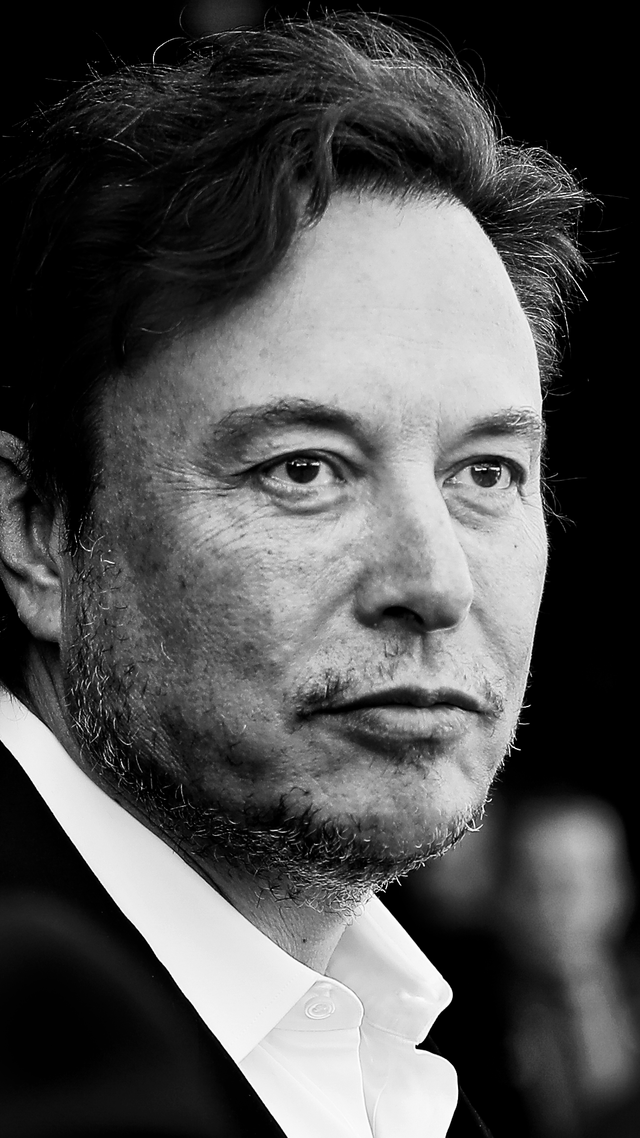
Given the scale of the assets at his disposal, if Musk decides to go big on giving it could have a massive impact on philanthropy. But whether this will be a good thing or not remains to be seen. He is also a divisive and controversial character: those who admire him often do so with an almost cult-like devotion, whilst his critics cite a growing track record of odd behaviour, picking fights, and making intemperate comments as reason to question his character. So what will Muskovite philanthropy (Or perhaps Musky philanthropy) look like? And what might it mean for the broader development of philanthropy and our societal narratives about it? To get an idea, it is worth looking at what we know so far about what Musk has done in terms of giving; what he has said about it; and (perhaps just as importantly) how he has said it.
Follow the Money: Muskovite Philanthropy to date
As noted already, the two main practical things we knew about Elon Musk as a philanthropist before this year were that he had a foundation and that he had signed the Giving Pledge. The general sense, however, was definitely that philanthropy was not something that he was terribly committed to, and that the giving he did was open to criticism on various fronts. A 2019 article in the Guardian noted that at that point the Musk Foundation had given $54m in 15 years- which is obviously not nothing, but represents only the tiniest fraction of his $200bn plus net worth. The same article noted that the foundation had funded projects that seemed to benefit Musk and his own family directly: including a campaign group his brother was involved in and a school his children attended. A 2020 article in Quartz, meanwhile, outlined the slightly odd range of causes that the Musk Foundation has supported — many of which reflect the slightly odd range of issues that Elon Musk himself seems to care about (from AI safety to the environment to libertarian politics).
That article also noted that the vast majority of the Musk Foundation’s giving (86 per cent!) at that point had gone to just three organisations: a research group run by the Silicon Valley tech accelerator Y Combinator and two donor advised funds owned by Musk (one with Vanguard and one with Fidelity). This was picked up in another article by NonProfit Quarterly, which pointed out that Musk was not alone in making this kind of gift from a private foundation to a DAF, as it is an increasingly common trend among Silicon Valley donors, but that his was a particularly eyebrow-raising example.
Musk’s involvement in the Giving Pledge has also brought him critical attention, with some noting that at his current pace of giving he is a very long way from achieving his promise to give away half of his wealth during his life (e.g. this Forbes article). Part of the challenge for Musk is that his fortune has increased at such a rate that giving away half of it is a significantly harder challenge than it was when he made his pledge back in 2012 (a problem, I must confess, that I struggle to muster up any real sympathy for…) The nature of his wealth is also a bit of an issue, as the vast majority of it is based on the stock valuation of Tesla and his other business ventures, so to realise it would require him to sell his holdings and that is not something he is currently planning on doing. Musk himself addressed this in a 2018 tweet in which he outlined his plans to sell small amounts of Tesla stock every few years to fund philanthropic donations, and then to give larger amounts “in about 20 years”. (Of course, this also assumes Tesla stock is not massively overvalued, which is a concern that various investors and commentators raise now and then).
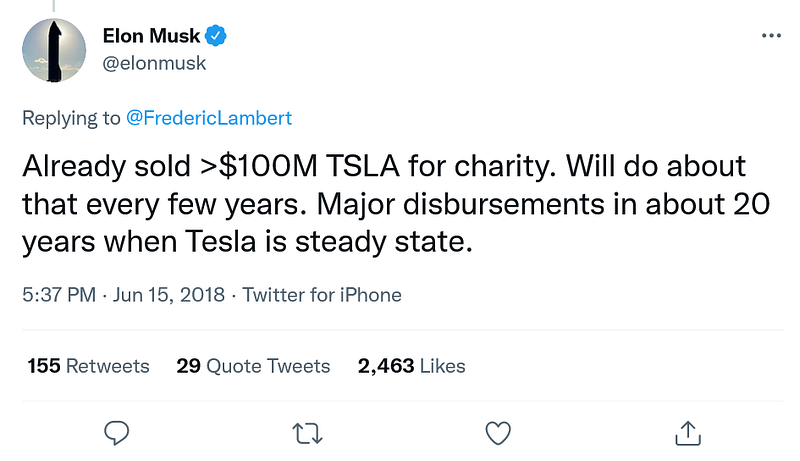
Since the start of 2021 there appears to have been a major shift in Musk’s approach to philanthropy. He started the year by asking his 63 million Twitter followers for advice on where to give, noting that in his opinion it is “way harder than it seems” to find “ways to donate money that really make a difference. Unsurprisingly he did not want for suggestions on how to use his money, and some of these seem to have played a part in a major increase in the levels of his giving: most notably the announcement of a new $100m dollar challenge prize for carbon-removal solutions to help address the climate crisis. As Teddy Schleifer pointed out in an article for Recode, together with other donations that puts Musk’s giving so far this year at $150m, and “That more than doubles [the] best estimate of all his charitable giving before 2021.”
So it seems clear that something is afoot with Muskovite philanthropy. What, then, do we know about how Elon Musk thinks about giving?
Tech Will Save (or Maybe Kill) Us: The Muskovite View of Philanthropy?
Musk hasn’t said vast amounts about philanthropy, but if we look at what he has said (and some of the things he has said about related topics) we can get a sense of where he might be coming from on various key questions. One thing he is clear about (as mentioned above) is that “giving money away effectively is hard”. He is, of course, far from alone in this: many big donors have echoed Carnegie’s view that “it is harder to give money away intelligently than to earn it in the first place”. And there is more than a grain of truth in this: in many ways it is hard to give away large sums if you have strong views on what counts as effectiveness and you want to retain an element of control. The interesting thing about restating this line of argument right now is that there is a clear counterpoint in the giving of Mackenzie Scott, who seems to be challenging the notion that it is hard to give away large sums through her own approach and the scale and pace of her giving. (For more thoughts on Mackenzie Scott’s giving, see this earlier blog I wrote).
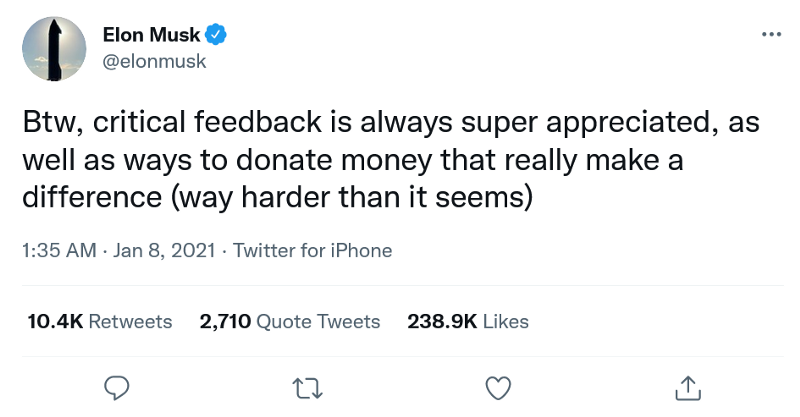
Musk also seems to diverge from Mackenzie Scott in terms of his view on the nature of wealth and inequality, and what this means for philanthropy. Scott clearly has a view that “self-made” wealth is a myth, and that all wealth to some degree or another is made possible by wider societal structures. She also seems to acknowledge that these structures are iniquitous — benefitting a few, whilst presenting barriers to many — hence she has written:
“There’s no question in my mind that anyone’s personal wealth is the product of a collective effort, and of social structures which present opportunities to some people, and obstacles to countless others.”
Musk, meanwhile, seems to conform far more to the archetype of believing that what wealth he has is a reflection of his own hard work and brilliance (one is reminded of Tony Stark (aka Iron Man) when asked to define himself, answering: “Genius, billionaire, playboy, philanthropist”…) Musk’s highly defensive reaction to recent proposals for a wealth tax on the richest individuals in the US suggests that he is not entirely bought into the idea that extreme wealth might be part of the problem, or that progressive taxation targeted at the very wealthy might be part of the answer.
One suspects, too, that Musk not only does not see his own wealth creation as problematic; he in fact sees it as a key part of the solution when it comes to the problems of society. The approach to giving of philanthropists through the ages have always been influenced to some degree by how they made their money: if you got rich through big industrial projects, you’re quite likely to think that large managerial organisations are the answer; whilst if you made billions from finance you’re probably prone to see clever financial engineering as the way forward. But today’s tech donors often take this one step further: claiming not just that their commercial experience might be relevant to their philanthropy, but that the products and platforms they have built are “solutions’’ that are already making society better. Elon Musk seems very much to take this view, and talks about his wealth creation and commercial operations in remarkably grandiose terms as a result. In response to questions or criticisms about why he is putting so much money into ventures like Space X whilst not doing more to give back to society, Musk’s standard response is to frame his ambition as “to make life multiplanetary” and “to extend the light of consciousness to the stars’’. In the past, perhaps unsurprisingly if this is how he views his commercial activities, this has meant he has been somewhat dismissive of more earthbound philanthropic concerns; and mused over whether he would be doing more good for humanity by simply doubling down on his businesses. (With any personal gain to himself entirely incidental. Obviously).

Even when it comes to more traditional philanthropic giving, there is a clear bias towards technology both in the problems and the solutions that Musk seems to be interested in. He was one of the founders of OpenAl, a research lab that focuses on the development of artificial intelligence that can benefit humanity (although Musk is no longer involved directly, and OpenAI has shifted from being a pure nonprofit to a hybrid). One of his larger donations to date has also been to the Future of Life Institute, which “works on reducing global catastrophic and existential risk from powerful technologies’’. This is very much in line with a wider trend of focussing on so-called “X Risks’’ and longtermism (which looks at issues over timescales of hundreds of years) that has seemingly become de rigueur among Silicon Valley donors (especially those who subscribe to the principles of Effective Altruism). Critics of this kind of approach argue that it detracts attention from the many pressing issues facing societies and communities around the world right now, in favour of focussing on terrible-sounding future catastrophes that might only have a vanishingly small probability of happening. (This recent piece in Aeon gives a good outline of some of the concerns about longtermism as an ideology).
Trolling, Bad Jokes & Spats: Philanthropy Discourse in the Muskovite Era?
Perhaps more important than what Elon Musk says about philanthropy is going to be the way in which he says it. He is known for bringing a distinctively Trumpian approach to his communications: often engaging in pretty wild hyperbole and being unafraid to launch ad hominem attacks (as he famously and bizarrely did against a British diving expert who had the temerity to question Musk’s plan to use a tiny submarine to rescue the Thai schoolboys trapped in a cave a few years back- although Musk won the subsequent libel case).
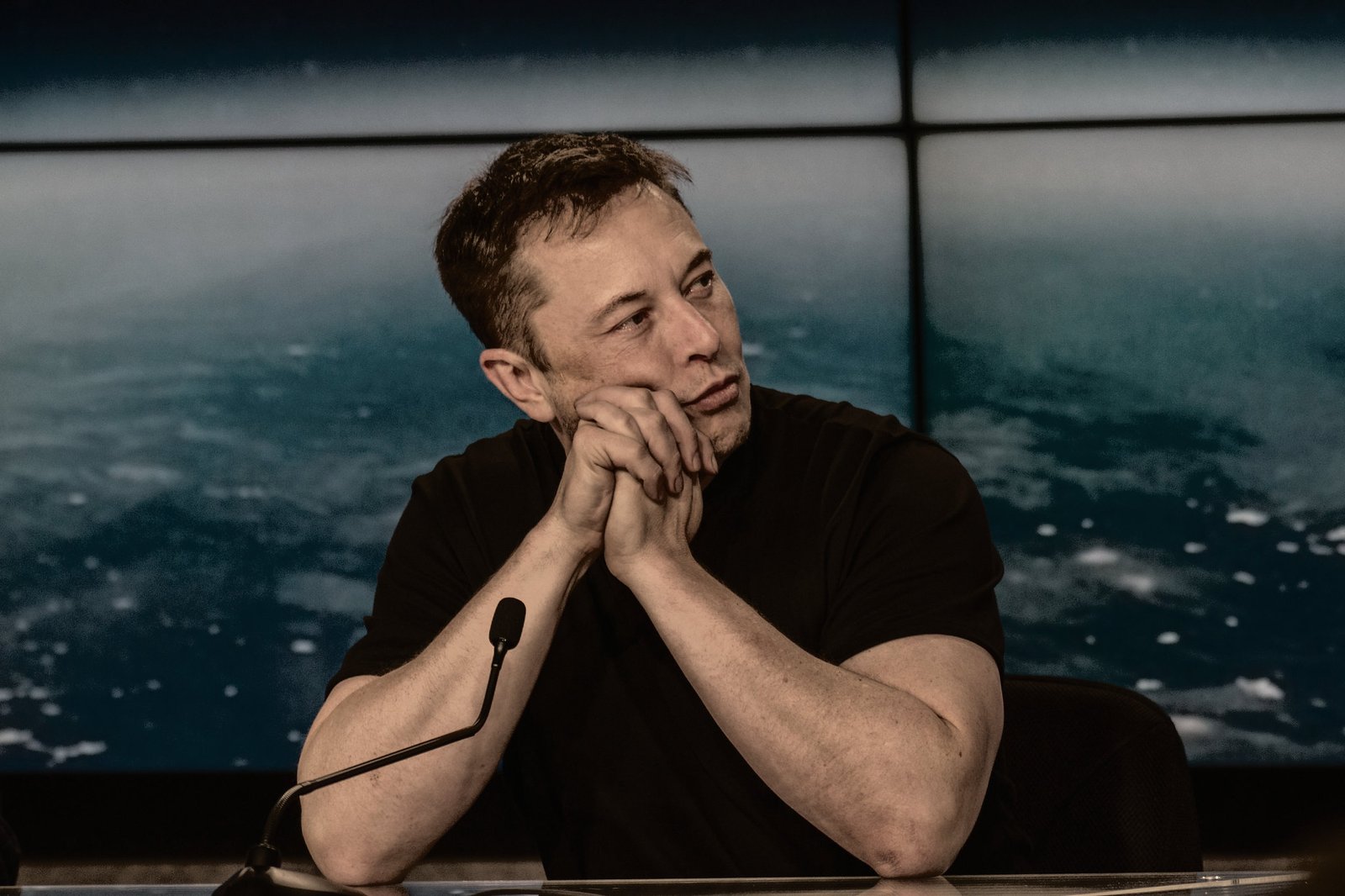
We have seen already that Musk is not afraid to engage in philanthropy issues in much the same way, as demonstrated by his interaction/spat with the World Food Programme. WFP Executive Director David Beasley started things by congratulating Musk on becoming the world’s richest person, and in the same message challenged him to use some of his money to help address world hunger; claiming that $6.6bn would be enough to “save 42 million people from starvation”. Musk then responded by saying that if the WFP could “show on this Twitter thread how $6bn will solve world hunger, I will sell Tesla stock right now and do it”.
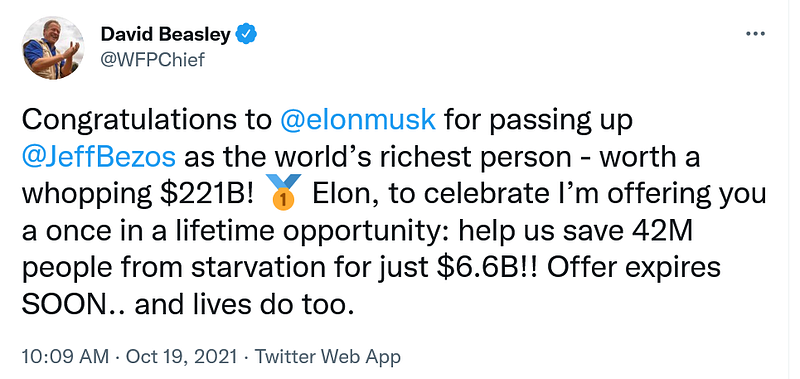
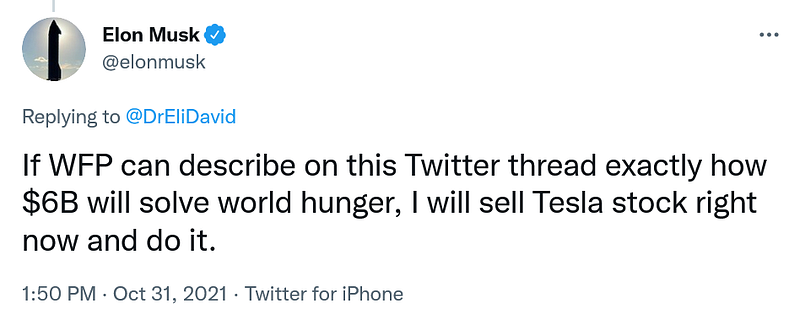
It’s hard to tell whether this is intended as a genuine request for more information by Musk, or simply as a snarky way of saying that he doesn’t believe their claim. The charitable interpretation would be the first, but given his previous track record on Twitter it is not entirely clear that we should extend such charity… What is perhaps more interesting is the way in which Musk and the WFP seem to have quickly ended up talking past each other: the original WFP point was framed only as “feeding starving people”, whereas Musk reinterpreted this as “solving world hunger”. This may not seem like a big distinction (and maybe I am reading too much into this), but it does turn on a fundamental difference of opinion about whether the purpose of giving should be to alleviate the symptoms of problems or to address their underlying causes. Many big donors (Musk presumably included) tend to argue that their role as philanthropists is to do the latter, as the former is the business of charity. Is it also telling that Musk framed his retort in terms of “solving” world hunger? Again, there is a strong tendency for elite philanthropists (and particularly those from a tech background) to buy into the notion of the “philanthropic lone saviour”, and to want to focus only on issues that they themselves can solve. For Elon Musk, perhaps a problem like global hunger is only worth giving to if he can “solve” it rather than merely contribute to addressing it?
The fascinating thing (to me) about all of this is that we know what we know not as the result of some press release, article, or big stage-managed event; but rather because Elon Musk is using Twitter to interact directly with people about his philanthropy- whether they are commending it or questioning it. In much the same way as Donald Trump harnessed the power of social media to talk directly to his voter base and thus bypass many of the traditional gatekeeping mechanisms of the media (and also the basic standards of normal human behaviour at the same time), will Musk’s emergence as a philanthropic big hitter herald a new era of discourse about philanthropy that is unfiltered and unmediated?
The idea of major philanthropists setting down their thoughts on giving is far from new: Andrew Carnegie most famously wrote his essay “The Gospel of Wealth”, but John D Rockefeller also wrote “The Difficult Art of Giving” and Julius Rosewald wrote “Principles of Public Giving” (among others). More recently, Mackenzie Scott has made the Medium post her chosen method of communication (as have all the best people…). Is Musk now going to take this further and establish a template in which we get the inner thoughts of donors via tweets? There is clearly a world of difference between an essay or blog post that is the result of careful consideration (and quite probably additional input from others) and a series of tweets that someone spurts out in response to something they have seen. The latter is almost certainly going to be less edifying in most cases, and the lack of consideration (plus the limitations of having only 280 characters) may mean that the depth of insight on show is much shallower. However, for anyone interested in really getting under the hood of philanthropy, the idea of having access to the unfiltered real-time thoughts of one of the world’s biggest donors seems like too good an opportunity to miss (for better or, quite possibly, worse). I for one will be getting out the popcorn and tuning in to see what happens….

